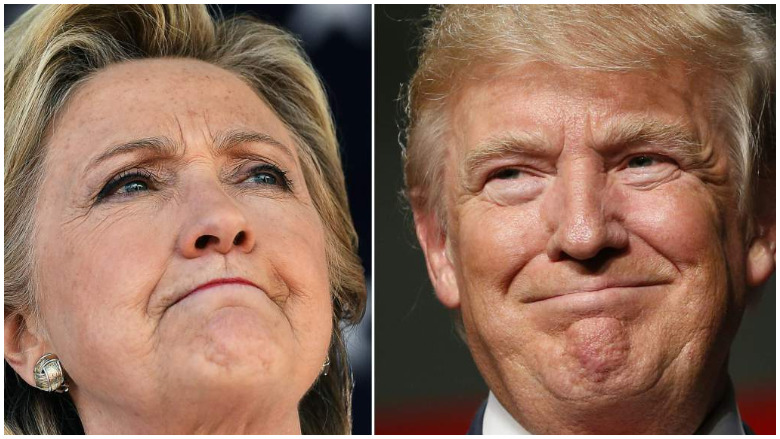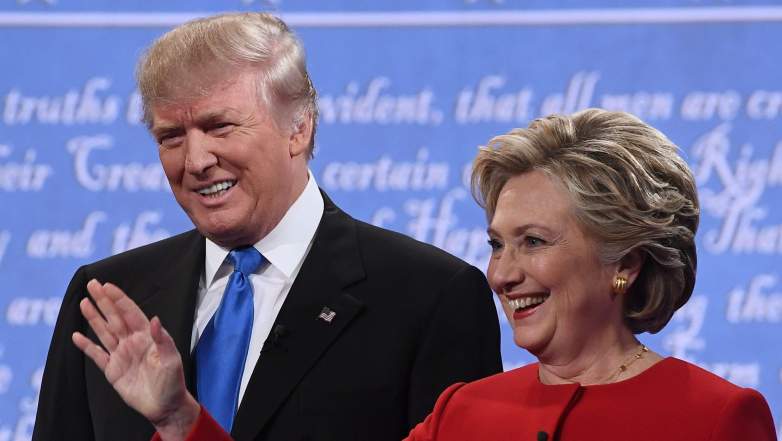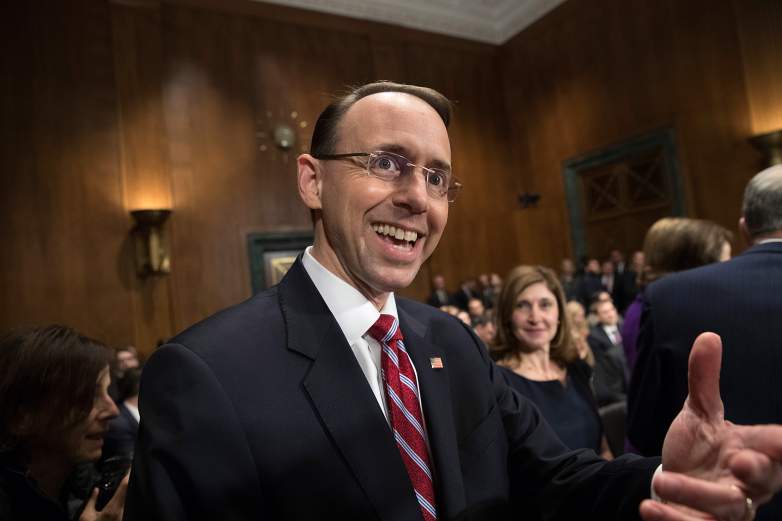
Getty Is it possible to do over the 2016 presidential election?
With the news that the U.S. government has now indicted 12 Russians for trying to influence the 2016 presidential election, some are wondering on Twitter: Is it possible to “do over” the 2016 presidential election?
To be sure, such musings are confined to social media and not serious discussion. Disclaimer right out of the gate here: This post is not meant to imply such a thing should or will happen. It’s mean to explore whether it’s even possible.
Deputy Attorney General Rod Rosenstein, in announcing the indictments on July 13, 2018, took pains to point out that the indictment does not allege that the operatives actually managed to influence the election’s outcome, just that they tried. He deemed such talk speculation. President Donald Trump denies any involvement in attempts by Russians to influence the election.
However, would it be possible to do over a presidential election? Some wish it was:
Here’s what you need to know:
Experts Disagree About Whether a Court Could Order a ‘Re-Vote’

GettyDonald Trump and Hillary Clinton arrive for the first presidential debate at Hofstra University in Hempstead, New York on September 26, 2016.
Marquette Professor Julia Azari wrote a lengthy 2017 article exploring the presidential do over question for FiveThirtyEight. She concluded that it’s unclear because the Constitution doesn’t speak to the issue. “…the Constitution itself focuses more on ensuring stability than on administering elections. As a result, there aren’t clear procedures for how to handle questions of legitimacy after the fact — especially when those questions involve the presidency,” Azari wrote.
Added Azari, “The text of the Constitution pretty much says an election is legitimate when the Electoral College says it is. It doesn’t lay out a process for do-overs.” She pointed out that courts ordered new elections in some non-presidential cases.
She added that the question could have come up in the 2000 presidential election due to some voters alleging the butterfly ballot in Florida confused them, and noted that one federal court has ruled “that the courts could order a new election.” She concluded, “experts disagree about whether courts can order presidential elections to be held again” but noted most agree the standard is very high to do so.
Law Professor John Banzhaf told LawNews that such a do-over is probably prevented by the U.S. Constitution.
“Any reasonable reading of Article II, Section 1, of the Constitution – which provides in considerable detail for the election of the president – would strongly suggest that, once Congress has determined ‘the Time of choosing the Electors, and the Day on which they shall give their Votes,’ that Congress cannot then, based upon a simple majority vote, provide for a do-over second election,” Banzhaf said to LawNewz.
However, University of California-Irvine School of Law Professor Rick Hasen, described as “a recognized expert in election law,” told the legal site, “I have never seen anyone try to redo an election based upon the release of information which influenced voters” but added “If there were evidence that the Russians or someone else interfered with either the voting itself or with the vote counting, then that could be a conceivable basis for a remedy.”
The experts argued to LawNewz that evidence would be needed showing “the Russians actually infiltrated voting machines or altered the vote count.”
In 2017, New York Magazine and Daily Intelligencer explored the question. If collusion was proven, the magazine concluded that Congressional impeachment would be the likely remedy not an election do over, but noted that such an action wouldn’t reverse the election because Mike Pence would become president.
As for the courts ordering an election do over, the magazine said the matter is not settled.
“…that contingency could only arise via extended and probably bitter and divisive litigation, and only then if very clear evidence of successful election-tampering appears,” noted New York Magazine. The magazine noted that it was unlikely that situations with “impossible-to-measure impact,” citing the hacked Clinton and DNC emails, would “lend itself to any realistic judicial remedy.”
Clinton’s Campaign Alleged in 2016 That the Russians Were Behind the Hacking
In 2016, well before 12 Russians were indicted and accused of a massive hack into Hillary Clinton’s campaign and the Democratic National Committee, Clinton’s campaign manager Robby Mook alleged Russia was behind the DNC hacking
Robby Mook, who ran Clinton’s presidential campaign, told CNN’s Jake Tapper during the presidential election that “experts” say “Russian state actors broke into the DNC, stole these emails, and other experts are now saying that the Russians are releasing these emails for the purpose of actually helping Donald Trump.”
He was also asked his reaction to the leak of the DNC emails, many of which were dumped by WikiLeaks and some by Guccifer 2.0, the latter of which the U.S. government now alleges was actually a cabal of Russian operatives intent on influencing the 2016 presidential election.
“Experts are telling us that Russian state actors broke into the DNC, stole these emails, other experts are now saying the Russians are releasing these emails for the purpose of actually helping Donald Trump… and that’s disturbing,” Mook said at the time. He added that Trump “and his allies made changes to the Republican platform to make it more pro-Russian.”
Mook continued, “When you put all this together it’s a disturbing picture…the hackers who got into the DNC are very likely to be working for Russia….I don’t think it’s coincidental that they are being released at this time to create maximum damage on Hillary Clinton and to help Donald Trump.”
In the wake of the controversy that caused, Trump’s campaign head Paul Manafort faced questions “about his alleged ties to Russia and whether the campaign is any way working with Russian President Vladimir Putin. ‘No,’ Manafort said on ABC. ‘It’s absurd.'”
Rod Rosenstein Announced the New Indictments But Said There’s No Allegation in Them That Any American Citizen Committed a Crime

Getty Deputy U.S. Attorney General nominee Rod Rosenstein arrives before the Senate Judiciary Committee for testimony March 7, 2017 in Washington, DC.
The new indictment, released July 13, 2018 by the U.S. government, now says that the conspirators hacked into accounts associated with Hillary Clinton’s campaign, the computer networks of the Democratic Congressional Campaign Committee, the Democratic National Committee, and covertly monitored the computers of dozens of DCCC and DNC employees, implanting malicious computer code and stealing emails.
One Russian unit stole information and the other disseminated the stolen information, Deputy Attorney General Rod Rosenstein said in the press conference revealing the indictments. They used a scheme known as “spearfishing,” by tricking users into disclosing their passwords. They also hacked into networks and installed malicious software. They accessed information of a U.S. presidential candidate, a Congressional campaign committee, and a national political committee. They planted malicious computer code and stole emails and other documents. They created fictitious personas including Guccifer 2.0 and DC Leaks. Both were created and controlled by the Russian GRU, Rosenstein said.
“There is no allegation in this indictment that any American citizen committed a crime. There is no allegation that the conspiracy altered the vote count or changed any election result,” added Rosenstein.
Rosenstein said the Russians tried to infiltrate computers of state boards, secretaries of states and others who administer elections. They work for two units of the main intelligence directorate of the GRU. They engaged in “active cyber operations to interview in the 2016 presidential election.” There are 11 criminal allegations and one forfeiture allegation.
The Russians corresponded with Americans but there’s no information the Americans knew who they were talking to.
On June 20, 2016, a month before a WikiLeaks’ dump of some of the documents, The Washington Post wrote that “two independent research firms have confirmed an assessment by the Democratic National Committee that its network was compromised by Russian government hackers” and said they used malware analysis and domain name techniques to trace the hacks. The Post said a few days later, “‘Guccifer 2.0’ claimed responsibility for the hack in an apparent attempt to deflect blame from the Russian government.” The Russian-aligned hacking groups were called Cozy Bear and Fancy Bear, said The Post. The Post concluded, “Analysts suspect but don’t have hard evidence that Guccifer 2.0 is, in fact, part of one of the Russian groups who hacked the DNC.”
On July 13, 2016, The Hill wrote that “Guccifer 2.0, the hacker who breached the Democratic National Committee, has released a cache of purported DNC documents to The Hill in an effort to refocus attention on the hack.” Guccifer felt that his early releases were not getting enough media attention, The Hill said. He wrote The Hill, “The press [is] gradually forget[ing] about me, [W]ikileaks is playing for time and [I] have some more docs.”
The indicted Russians were named as: Viktor Borisovich Netyksho, Boris Alekseyevich Antonov, Dmitriy Sergeyevich Badin, Ivan Sergeyevich Yermakov, Aleksey Viktorovich Lukahsev, Sergey Aleksandrovich Morgachev, Nikolay Yuryevich Kozachek, Pavel Vyacheslavovich Yershov, Artem Andreyevich Malyshev, Aleksandr Vladimirovich Osadchuk, Aleksey Aleksanderovich Potemkin, and Anatoliy Sergeyevich Kovalev.
Guccifer 2.0 Said ‘He’ Targeted The DNC Because The U.S. Election is ‘Exciting’ & He Didn’t Like Hillary But Didn’t Like Everything About Trump, Either
Guccifer 2.0, now alleged to be the Russian hacker group, wrote on “his” blog that “none of the candidates has my sympathies. Each of them has skeletons in the closet and I think people have a right to know the truth about the politicians.” He called Hillary “false,” saying she “got all her money from political activities and lobbying, she is a slave of moguls, she is bought and sold. She never had to work hard and never risked everything she had. Her words don’t meet her actions. And her collision with the DNC turned the primaries into farce.”
He wrote that he likes that “Donald Trump has earned his money himself. And at least he is sincere in what he says. His position is straight and clear” but says he doesn’t necessarily support Trump because he opposes his “ideas about closing borders and deportation policy. It’s a nonsense, absolute bullshit.”
Guccifer 2.0 wrote that he targeted the DNC in part because the U.S. election is exciting and the hack would make him famous. On his website, he writes, “As for the DNC, first, the U.S. election race is one of the most exciting events that attracts people from all over the world. My hack wouldn’t go unnoticed in any case. And now I have my own fans who put me in a line with Assange and Snowden, so my bet has played I think.”
He said he was able to hack into the DNC servers by exploiting software on their system and then installing “my Trojan like virus on their PCs. I just modified the platform that I bought on the hacking forums for about $1.5k.”
